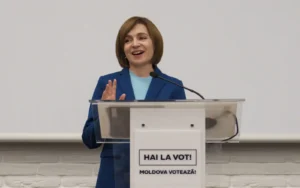Photo: Voting for the Presidential Election in Moldova – Wikimedia Commons
On Sunday October 20, voters in Moldova went to the polls to elect a new president and to vote on an EU referendum. The turnout for both the referendum and the presidential election was around 50%. Unfortunately, the elections were marked by many reports of voter fraud and it is unclear how fair the elections were.
Presidential Election
For the presidential election, no candidate reached more than 50% of the votes, meaning that there will be a runoff on November 3 between the two candidates that performed the best. The incumbent president, Maia Sandu, from the pro-European Party of Action and Solidary (PAS), got 42% of the votes, while independent candidate, Alexandr Stoianoglo, who has been endorsed by the pro-Russian Party of Socialists of the Republic of Moldova (PSRM) attained 26%.
This looks like a large victory for Sandu, but when the entire opposition supports Stoianoglo, she might not be able to reach 50% of the votes in the second round. In 2020, Sandu only got 36% of the votes in the first round, while the candidate for the PSRM reached 32%. However, in 2020 she was endorsed by the candidate that became third. This time it is expected that all the other candidates will endorse Stoianoglo.
If Stoianoglo wins the runoff of the presidential election, this can be an immediate threat for the pro-European course that Moldova has taken under the leadership of Sandu and which has led to accession talks with the EU. The PSRM, the party that supports Stoianoglo, has for example stated that Ukraine was the aggressor in the war between Russian and Ukraine. Such views clearly clash with a pro-European course.
EU Referendum
In the EU Referendum, Moldovans could vote whether the ambition to join the EU should be included in the constitution of the country. Before Sunday, it was expected that a large majority would vote in favor of the referendum, but it turned out that the results were almost 50/50, with around 50.4% voting in favor and 49.6% voting against it.
Both supporters and critics of the Referendum attacked Sandu for making the referendum coincide with the presidential election. Critics accused Sandu of attempting to boost her popularity with this referendum, while supporters argued that pro-European voters might vote against the referendum as a protest vote against Sandu. According to them, it would have been better to organize it at a later time.
Interestingly, the Moldovan diaspora, mainly living in Europe or the US, was decisive for the outcome of the Referendum. 77% of the Diaspora voted in favor of the referendum, while the percentages in Moldova itself were way lower. The Breakaway state of Transnistria and the autonomous region of Gagauzia decisively voted against the referendum. In Gagauzia a shocking 95% of the voters voted against the referendum.
You can find the exact results of the elections here.
Russian Interference
Before the election, there were already many reports of organized attempts of voter fraud. Ilan Shor, a former member of parliament who fled to Russia after being charged with fraud, has been accused of leading an election interference mission from Moscow. There have, for example, been many reports of money being funneled from Russia to Moldova in an attempt to buy votes against the Referendum and Sandu. Moreover, there have been reports of voters being bribed at polling stations.
On Monday, one day after the elections, Sandu declared that the disappointing results were due to massive voter fraud, stating that the Russian interference in the election was an “unprecedented assault on democracy.” To what extent Russia has exactly meddled in the elections is not clear, but there is no doubt that Russia has both the intention and the means to interfere with the elections in Moldova.
Consequences of the Election
Whereas Sandu and her party hoped that these elections would show a clear support for joining the EU, this clearly did not happen. Sandu did not get enough votes to win the presidency in the first round and might lose in the second round. At the same time, the EU referendum was only narrowly accepted with a margin of 0.4%.
Moreover, the amount of Russian interference is very worrying. It shows that Russia is prepared to spend a lot of money to meddle in the fairness of elections. We do not know how effective this interference has been, but even if it was only a little bit effective, a lot more of it can be expected in the future.
While Moldova has started accession talks with the EU, it will most likely take a long time before they can join the EU. This gives Russia and people like Shor a lot of opportunity and time to disturb Moldova’s pro-European course. If Stoianoglo wins the runoff of the presidential election in November, they might have their first victory, and probably not their last.
You can watch our preview of these elections with Igor Batog, the director of the Foundation for Democracy and Progress, here.
Written by Guido Boven



